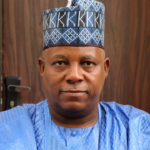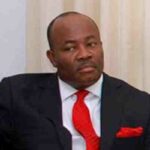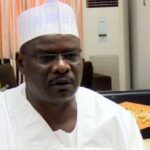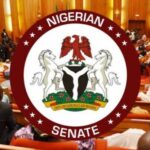With the inauguration of the Tenth National Assembly (2023-’27) billed for Tuesday June 13, 2023, the stakes have heightened to fever pitch for the contestants eying the plum offices of the presiding officers of the Senate and House of Representatives. The offices contested for are those of President of the Senate and the Speaker House of Representatives, along with the deputies. In that context therefore has been a frenzy of activities featuring heated debates, along with claims and counter claims bordering on the touted capacities of the aspirants.
Typical of the nature of political tussles in Nigeria, the scenario has generated mixed reactions among the citizenry. While some may feel various levels of concern by the swings, twists and turns in the course of the tussle, others are inclined to endorse and even hail the ongoing jostling for advantages by the aspirants and their supporters with the end expectedly the emergence of the best hands for the jobs.
At the last count, the four aspirants contesting the office of President of the Senate comprise Osita Izunaso, Godswill Akpabio, Orji Uzor Kalu and Abdulazeez Yari. Meanwhile a less tangled race features in the House of Representatives with the leading figures being Tajudeen Abass for Speaker and Benjamin Kalu for Deputy Speaker. With each of them eminently qualified for the offices contested for, the issue remains that of who will deliver best for the country, given their backgrounds and challenges associated with the respective offices.
The foregoing notwithstanding, it is significant that given the course of the contests, Nigerians may wake up on the inauguration Tuesday to find out that the offices had been pre-filled with ‘anointed’ candidates, who will ascend into such offices without the input of the wider membership of the institution, simply because President Bola Ahmed Tinubu, had endorsed them accordingly. This outcome remains the likely end game for the template of single candidate for each of the offices, as is being bandied around as the only way that harmonious relationship can be fostered between the executive and legislative arms of government under President Bola Tinubu. So loud has the cacophony from this advocacy raged that opposition to it even among the incoming legislators in the Tenth National Assembly has seemingly been silent or subdued at best.
Yet against the backdrop of the din and drama associated with the ongoing campaign lies the need to accentuate the sundry challenges and expectations of Nigerians as far as the Tenth National Assembly is concerned. In this respect lies the basic mission of the Tenth National Assembly as a legislature which is to deliver on its three functions namely law making, constituency representation and oversight the business of the executive arm.
That is why the seeming dispensation whereby the only way good governance can be guaranteed under President Bola Tinubu is by the Tenth National Assembly acting in subservience and patent servitude to him, remains highly suspect. By virtue of the provisions of the Nigerian Constitution, the entire dispensation constitutes a sell-out of the independence of the incoming legislature, even before its inauguration.
And hardly can any tell-tale sign of this eventuality be stronger that the appointment of Femi Gbajabiamila—Speaker of the immediate past House of Representatives in the outgone Ninth National Assembly as the Chief of Staff to President Bola Tinubu. While any query on the choice of Gbajabiamila may not derive from a personal handicap of his, the subservient posture towards the executive arm which he led the House of Representatives to adopt under his watch (2019-‘23) offers an indication of how the Tinubu Presidency may pan out in the course of time.
In any case, it is for good measure that the Tenth National Assembly is coming at a time of deep historical significance which renders it a landmark dispensation in the country’s political history. It is coming as the first legislature after Nigeria’s 100 years of legislative experience given that the arm of government was birthed in 1922 by Nigeria’s second Governor General – Sir Hugh Charles Clifford. This situation renders its advent a landmark dispensation that offers valid lessons on how far the country has fared in its first century of legislative enterprise.
While the country’s entire legislative establishment may have hardly offered a whimper to the historicity of a century of Nigeria’s legislative enterprise, such a disposition hardly detracts from the value of the dispensation. Nigeria’s political development had followed a most dramatic and effervescent trajectory that hardly a day passes without one twist or the other. Hence a hundred years in its political history offers copious lessons on the journey so far.
What with the insights from the Legislative Council (LEGCO) years, the era just before the 1960 independence proper, the coming of the country as a republic in 1963, the ‘locust years’ being the instances of military incursions into civil governance, the 30 month Civil War, the various efforts at fostering workable civil rule in the country, the June 12 1993 electoral imbroglio and the tectonic political impact it imposed on the country, the return to democratic rule with the current advent of the Bola Ahmed Tinubu Presidency. The reason for this seeming odyssey – deep into the country’s political history is to explore past scenarios where the principle of total control of the entire machinery of government by the executive had been exercised, and the outcomes of such enterprise. And as the lessons of history have taught, the outcomes have never been sustainably beneficial to the country. Hence lies the ultimate misstep by the Bola Tinubu presidency in its alchemy of concocting the protocol for a firm grip on all the powers and functions of the legislature and executive arms under its brief as early steps are revealing. It is akin to forcing two hands into one mouth.
Coming back to the leadership tussle in respect of the Tenth National Assembly, the better approach by President Bola Tinubu is not to impose individuals on the institution but set up criteria for any emergent leadership to be disposed to work with the presidency. Typical criteria may include the absence of any scandal associated with any individual in the race, understanding of the workings of the National Assembly from its past to the present, as well as contributions to the fortunes of the All Progressives Congress (APC).
It is by virtue of these criteria that the cap of President of the Senate fits the head of one individual who had served in the National Assembly in various capacities both as a staff and serial legislator (Member of the House of Representatives and Senator) as well as first National Organising Secretary of the APC, among other positives. Keeping any other subjective criteria aside, he is the man Tinubu needs for this job. His name is Osita Izunaso.




